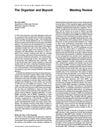 252 citations,
April 2009 in “Seminars in Cell & Developmental Biology”
252 citations,
April 2009 in “Seminars in Cell & Developmental Biology” The immune system plays a key role in tissue repair, affecting both healing quality and regenerative ability.
[object Object]  118 citations,
October 2013 in “Trends in Genetics”
118 citations,
October 2013 in “Trends in Genetics” The AUTS2 gene is linked to neurological disorders and may affect human brain development and cognition.
 August 2009 in “Mechanisms of Development”
August 2009 in “Mechanisms of Development” Adult hair follicle cells can create new hair follicles from corneal cells with the right support.
 480 citations,
August 2014 in “Nature Biotechnology”
480 citations,
August 2014 in “Nature Biotechnology” Changing the environment around stem cells could help tissue repair, but it's hard to be precise and avoid side effects.
 47 citations,
May 2012 in “Wiley Interdisciplinary Reviews-Developmental Biology”
47 citations,
May 2012 in “Wiley Interdisciplinary Reviews-Developmental Biology” The conclusion is that understanding how feathers and hairs pattern can help in developing hair regeneration treatments.
 28 citations,
January 2008 in “Journal of medical investigation”
28 citations,
January 2008 in “Journal of medical investigation” Sp6 promotes tooth development by reducing follistatin levels.
 10 citations,
May 2019 in “Seminars in Cell & Developmental Biology”
10 citations,
May 2019 in “Seminars in Cell & Developmental Biology” Understanding and manipulating epigenetic changes can potentially lead to human organ regeneration therapies, but more research is needed to improve these methods and minimize risks.
 9 citations,
March 2019 in “Scientific reports”
9 citations,
March 2019 in “Scientific reports” Temporary ROS production in cultured human hair follicles promotes growth and stem cell activation.
 9 citations,
July 2001 in “Cell”
9 citations,
July 2001 in “Cell” Cells from certain embryo parts can induce head formation in another embryo, involving complex signaling pathways.
 May 2024 in “Scientific reports”
May 2024 in “Scientific reports” Twist2 is essential for scarless skin healing and hair growth in mouse fetuses.
 March 2024 in “Research Square (Research Square)”
March 2024 in “Research Square (Research Square)” Twist2 is essential for proper skin healing and hair growth in developing mice.
 September 2021 in “Research Square (Research Square)”
September 2021 in “Research Square (Research Square)” Not having enough or having too much of the protein Grainyhead-like 3 leads to various developmental problems.
 November 2018 in “Atlas of genetics and cytogenetics in oncology and haematology”
November 2018 in “Atlas of genetics and cytogenetics in oncology and haematology” WNT10B is linked to cancer development and affects survival and disease progression in various cancers.

Chemicals and stem cells combined have advanced regenerative medicine with few safety concerns, focusing on improving techniques and treatment effectiveness.
 1066 citations,
March 2010 in “Nature Reviews Molecular Cell Biology”
1066 citations,
March 2010 in “Nature Reviews Molecular Cell Biology” MicroRNAs are crucial in controlling cell signaling, affecting cancer and tissue regeneration.
 295 citations,
June 2009 in “Science”
295 citations,
June 2009 in “Science” Stromal stem cells may help heal wounds by becoming structural cells or affecting the immune system, but more research is needed to understand how.
 277 citations,
June 2003 in “The journal of investigative dermatology. Symposium proceedings/The Journal of investigative dermatology symposium proceedings”
277 citations,
June 2003 in “The journal of investigative dermatology. Symposium proceedings/The Journal of investigative dermatology symposium proceedings” Epithelial-mesenchymal interactions control hair growth cycles through specific molecular signals.
 248 citations,
November 2011 in “The EMBO Journal”
248 citations,
November 2011 in “The EMBO Journal” Wnt1/βcatenin signaling is crucial for heart repair after injury.
 243 citations,
October 2003 in “Developmental biology”
243 citations,
October 2003 in “Developmental biology” Ectodin integrates BMP, SHH, and FGF signals in developing ectodermal organs.
 212 citations,
May 2012 in “Genes & Development”
212 citations,
May 2012 in “Genes & Development” Planarian regeneration begins with a specific gene activation caused by injury, essential for healing and tissue regrowth.
 182 citations,
August 2016 in “Development”
182 citations,
August 2016 in “Development” ATP-dependent chromatin-remodeling complexes are crucial for gene regulation, cell differentiation, and organ development in mammals.
 178 citations,
May 2006 in “Developmental Dynamics”
178 citations,
May 2006 in “Developmental Dynamics” Jumonji genes are important for development and their mutations can cause abnormalities, especially in the heart and brain.
 157 citations,
May 2021 in “Endocrine Reviews”
157 citations,
May 2021 in “Endocrine Reviews” Early diagnosis and individualized treatment improve outcomes for Congenital Adrenal Hyperplasia.
 156 citations,
December 2012 in “Cell Stem Cell”
156 citations,
December 2012 in “Cell Stem Cell” TGF-β is crucial for controlling stem cell behavior and changes in its signaling can lead to diseases like cancer.
[object Object]  144 citations,
August 2019 in “Cells”
144 citations,
August 2019 in “Cells” The WNT signaling pathway is important in many diseases and targeting it could offer new treatments.
 141 citations,
August 2017 in “Developmental Dynamics”
141 citations,
August 2017 in “Developmental Dynamics” The document concludes that a better understanding of cell changes during wound healing could improve treatments for chronic wounds and other conditions.
 127 citations,
January 2015 in “Journal of Biological Rhythms”
127 citations,
January 2015 in “Journal of Biological Rhythms” The skin's internal clock affects healing, cancer risk, aging, immunity, and hair growth, and disruptions can harm skin health.
 106 citations,
September 2010 in “Stem cells”
106 citations,
September 2010 in “Stem cells” Skin-derived precursors in hair follicles come from different origins but function similarly.
 98 citations,
June 2008 in “Human mutation”
98 citations,
June 2008 in “Human mutation” A genetic change in the EDAR gene causes the unique hair traits found in East Asians.
 96 citations,
June 2017 in “Nature Communications”
96 citations,
June 2017 in “Nature Communications” A WNT10A gene mutation leads to ectodermal dysplasia by disrupting cell growth and differentiation.






























